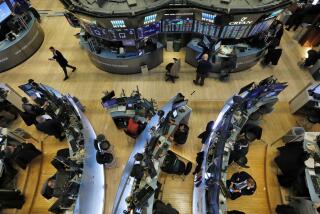Fact Must Vie With Rumor in Markets Shaken by Crisis
- Share via
NEW YORK — Financial markets have been rattled by fiction along with fact, as rumors about the Mideast crisis sweep through trading floors and vanish before traders can catch their breath.
“There’s been a rumor an hour,” said Joseph Liro, senior vice president at S. G. Warburg & Co.
The rumors generally insinuate some type of escalation in Persian Gulf tensions, including bombings, attempted assassinations and declarations of war.
Since Iraq’s invasion of Kuwait, traders have been on edge, snatching any scraps of information. In their haste, markets move on a rumor before it has been verified or denied.
Rumors can be tricky because of their potential to contain at least a grain of truth. Early in the conflict, rumors circulated that U.S. troops were headed for Saudi Arabia before President Bush made the actual announcement. Markets moved on the rumor, and traders who missed the action found little solace in Bush’s words.
Markets generally abide by the axiom “buy the rumor, sell the fact.” In the case of the Middle East, the bond market has applied “sell the rumor, buy the fact,” one trader said.
A rumor earlier in the week that a U.S. jet had been shot down prompted a sell-off in U.S. bonds and a rally in the dollar. The Pentagon later denied the rumor, but the denial had less impact.
In the bond market, Liro said, if a rumor moves oil prices one way, bonds will move in the opposite direction.
More to Read
Inside the business of entertainment
The Wide Shot brings you news, analysis and insights on everything from streaming wars to production — and what it all means for the future.
You may occasionally receive promotional content from the Los Angeles Times.










